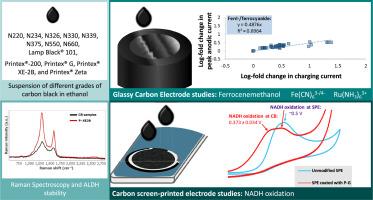Electrochemical characterization of carbon black in different redox probes and their application in electrochemical sensing
IF 3.1
Q2 MATERIALS SCIENCE, MULTIDISCIPLINARY
引用次数: 0
Abstract
Carbon black - materials rich in carbon nanostructures - have been successfully applied as modifiers of electrochemical transducers, rivalling other carbon nanomaterials for cost and ease-of-use. Despite the remarkable promise of this nanomaterial, no study has yet comparatively characterised a wide range of different grades of carbon black for their utility in electrochemical sensors. Here, we explore several commonly-studied carbon black grades (N220, N234, N326, N330, N339, N375, N550, N660 and Lamp Black-101), alongside relatively newer grades (Printex®-200, Printex® G, Printex® XE-2B, and Printex® Zeta) for their application in electrochemical sensors. The effects of coating glassy carbon electrodes with carbon black on electrode performance were studied by cyclic voltammetry using three redox probes: ferri-/ferrocyanide (anionic probe molecules), ferrocenemethanol (neutral) and hexaammineruthenium (cationic). Raman Spectroscopy characterisation of the different grades associated a lower degree of graphitisation with superior electrode modifiers. Generally, modification increased the anodic peak current for ferri-/ferrocyanide probes; and lowered anodic potential for ferri-/ferrocyanide and hexaammineruthenium probes. Increases in peak current and potential observed at ferrocenemethanol are consistent with the increased tendency for this probe to adsorb to the surface of modified electrodes. N330 and Printex® XE-2B displayed the best electrocatalytic properties in terms of enhanced peak currents and lowered anodic overpotentials for the redox probes. CB grades were used to modify screen-printed carbon electrodes and the obtained sensors examined for anodic detection of reduced nicotinamide adenine dinucleotide (NADH) cofactor by cyclic voltammetry. Printex® XE-2B significantly improved the detection of NADH and was further used for chronoamperometric detection of NADH at low overpotentials. Grades N220, N375, N550 and P-G showed their suitability as enzyme scaffolds for sensor fabrication, as determined by their preservation of the activity of a NAD-dependent aldehyde dehydrogenase.

不同氧化还原探针中炭黑的电化学特性及其在电化学传感中的应用
碳黑--富含碳纳米结构的材料--已成功用作电化学传感器的改性剂,其成本和易用性可与其他碳纳米材料相媲美。尽管这种纳米材料前景广阔,但目前还没有研究对各种不同等级的炭黑进行比较,以确定它们在电化学传感器中的用途。在此,我们探讨了几种常用的炭黑牌号(N220、N234、N326、N330、N339、N375、N550、N660 和 Lamp Black-101),以及相对较新的牌号(Printex®-200、Printex® G、Printex® XE-2B 和 Printex® Zeta)在电化学传感器中的应用。使用三种氧化还原探针:铁氰化/铁氰化(阴离子探针分子)、二茂铁甲醇(中性)和六氨钌(阳离子),通过循环伏安法研究了在玻璃碳电极上涂覆炭黑对电极性能的影响。不同等级的拉曼光谱表征表明,优质电极改性剂的石墨化程度较低。一般来说,改性会提高铁氰化/铁氰化探针的阳极峰值电流;降低铁氰化/铁氰化和六氨勒钌探针的阳极电位。在二茂铁甲醇中观察到的峰值电流和阳极电位的增加与这种探针吸附到改性电极表面的趋势增加是一致的。N330 和 Printex® XE-2B 在氧化还原探针的峰值电流提高和阳极过电位降低方面显示出最佳的电催化性能。我们使用 CB 牌号对丝网印刷碳电极进行了改性,并通过循环伏安法对所获得的传感器进行了阳极检测,以检测还原型烟酰胺腺嘌呤二核苷酸(NADH)辅助因子。Printex® XE-2B 显著提高了 NADH 的检测能力,并进一步用于低过电位下 NADH 的时变检测。等级 N220、N375、N550 和 P-G 显示出其作为酶支架用于传感器制造的适宜性,这是由它们对依赖于 NAD 的醛脱氢酶的活性的保持所决定的。
本文章由计算机程序翻译,如有差异,请以英文原文为准。
求助全文
约1分钟内获得全文
求助全文
来源期刊

Carbon Trends
Materials Science-Materials Science (miscellaneous)
CiteScore
4.60
自引率
0.00%
发文量
88
审稿时长
77 days
 求助内容:
求助内容: 应助结果提醒方式:
应助结果提醒方式:


